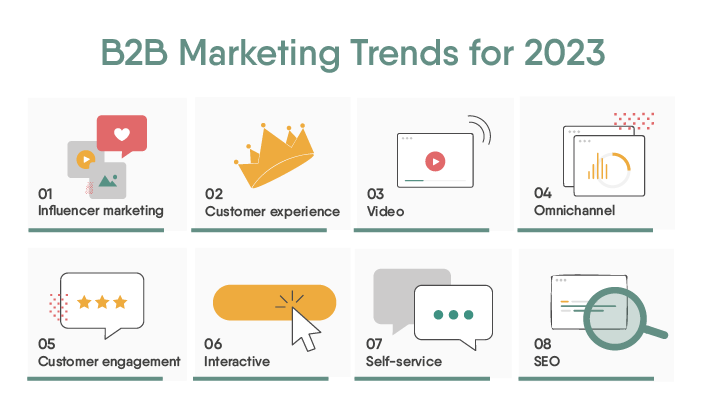What’s next for B2B digital marketing trends in 2023?
Traditionally, B2B companies, unlike B2C, have always operated on leaner budgets. With the general practice being an allocation of 2 – 5% of gross target revenues, a large chunk of marketing budgets are typically spent on ads.
This move comes at a grave opportunity cost; if we’re to believe findings from this Warc Report, advertising is forecasted to take a hit from 8.3% in 2022 to just 2.6% in 2023.
This means, for marketing teams globally, winter is here — whether that’s navigating the seasonal shift in customer behaviour on the cusp of a new year, or bracing for leaner ad budgets going into 2023 after a year of economic uncertainty.
For B2B marketers grappling with slashed marketing budgets, aligning marketing operations with shifts in B2B consumer behaviour to create an effective, tailored marketing plan may give the best stretch for every Euro.
However, even for B2B companies with a large enough marketing budget, today’s hyper-competitive commercial landscape leaves them still needing some extra room to surpass the competition and strike gold with customers.
In other words, it’s time to finetune your marketing plan in line with recent research and up-to-date marketing trends. This post is all you need to get up to speed.
Here’s the lowdown on the new marketing trends: what to expect, where to pull back, and where to channel marketing efforts and spend in 2023. You’ll also learn about the dominant trends in the market, where to stay the course, and how to leverage them for ROI. Let’s get down to business!
What are the Upcoming Digital Marketing Trends?
Let’s take a look back at the timeline to 2022. Until COVID-19 highlighted the need for digital transformation — the adoption of digital technology in all business operations — across companies, it was only adopted by 15% of B2B firms.
The new buzzword is digital optimisation — the use of digital technology to enhance current systems and procedures — a huge part of which finds its way into marketing.
With digital optimisation now front and centre of marketing operations, the head-scratcher for most marketing teams is, “what percentage of your revenue should go towards marketing?”
Forrester’s 2022 B2B Marketing Survey, sampling the opinions of marketing leaders (over 1,060), shares some interesting insight. A little over half — 51% — of enterprise companies that grew annual revenue by more than 20% in 2021 invested between 6.1 to 9% in marketing.
On the flip side, only a third of enterprise organisations that declined invested anywhere within that range. Your CMO most likely understands they need to justify their budget demands, so they must also identify where high-growth B2B companies are shovelling the cash in their marketing.
The same Forrester survey reveals that high-growth companies invest in marketing strategies that:
- Caters to changing buyer behaviour
- Distils the essence of brands to position firms as a purpose-driven
- Leverage post-sale customer engagement.
Without further ado, here’re our top picks for marketing trends deserving of a spot in your 2023 marketing plan:

Marketing trend 1:
Influencer marketing
Today, influencer marketing is all the rage, and it remains likely to stay this way heading into the new year as consumers trust recommendations from people they relate to and admire. More so when these influencers are known for honest reviews from PR packages received or beta test trials.
The Influencer Marketing Benchmark Report shows that influencer marketing can achieve impressive results, with an average earned media value of $5.20 for every $1 spent. This lends credibility to the argument that people feel more compelled to act on the recommendation of trusted influencers.
Plus, working with influencers allows for targeted and personalised marketing — influencers have built an engaged audience that businesses can target rather than having a generic message for a broad audience.
The best bit? It’s also been shown to be a more cost-effective option, as businesses can use micro-influencers with small-but-highly-engaged followings rather than spend large amounts on celebrity endorsements.
Overall, influencer marketing offers many benefits for businesses, which means it shouldn’t be overlooked as part of your marketing plan.
Marketing trend 2:
Personalised customer experience and quick response
Modern buyers want immediate responses and communications tailored to them; much of 2022’s B2B marketing plan fulfilled this requirement. Given the pace of technological innovation over the years, more B2B customers are making purchasing decisions online. As such, customers will equally demand faster and more personalised service.
To meet these needs, B2B companies must leverage customer data to provide personalised experiences and utilise communication channels such as email, chat, and social media for quick responses. They can also equip customer service teams to respond swiftly to inquiries and concerns.
This entails active social listening and joining customer conversations on social media or communicating updates, branding, and initiatives using email newsletters. There’s no personalisation without data.
Digital marketing tools like Apsis One could be of real value when making the most of the available data needed to foster long-lasting relationships with clients.
With Apsis One, you can deploy the segmentation tool to delineate audiences into different sets based on their demography, psychography, preferences, and consumer behaviour. This helps you deliver personalised, relevant content when running your marketing campaigns. Book a demo now here!
Marketing trend 3:
Video-based B2B marketing, but AI-driven
522productions launched a product procurement study where they found that an estimated 70% of B2B buyers watch a brand’s videos before they convert. The massive engagement of video makes it an increasingly attractive industrial marketing trend.
Here’s why: not only is it more consumable on the go, but it’s an effective medium to tell highly visual stories or explainers about products — a goldmine for teams looking to increase user adoption and conversation rates.
Using videos, brands can leverage webinars and virtual events to promote engagement, enabling clients to participate in facility tours, showcase thought leadership and expertise using instructional videos and explainer videos, and facilitate effective client onboarding, introducing your team and highlighting company values.
The emergence of the latest digital marketing tools and technology makes video marketing a fanciful proposition for B2B marketers looking to delight buyers with exceptional experiences. Take AR. Augmented Reality is a useful tool for marketers looking to give buyers an experience of their product in real time.
It can also serve as a key differentiator for marketers to increase conversion rates and sustain customer loyalty.
Marketing trend 4:
The more, the better: Go omnichannel
A new trend that will continue to gain traction in 2023, B2B marketers are striking gold with omnichannel as they look to leverage multiple platforms to acquire new customers and harness data analytics from data that is a product of their interaction with these customers.
B2B Customers require a mix of traditional sales channels (think phone and video calls) and self-service (think e-commerce and digital portals). Omnichannel marketing in B2B means marketers have a deeper insight into customer behaviour, which means better targeting, and a better understanding of attribution, leading to an inevitable increase in conversion rates.
This Adroll survey comprising 1000 B2B and B2C marketers evaluated the impact of omnichannel on their marketing operations. The survey found that 56% of marketers can understand what side of their marketing is deserving of more spend, and it also helps 44% of marketers justify their marketing budget. With Omnichannel, 43% of marketers get to analyse how best to optimise their marketing campaign performance.
In 2022, B2B firms that give power and freedom back to prospects in their interaction will be highly rated as customer expectations are driving the omnichannel trend. The rise of social media sites and technology as a marketing/sales channel will allow B2B firms to create unified campaigns and consistent brand experiences across channels.
This’ll involve not only conversion but also social listening. Namely, taking stock of reviews and feedback on software to improve products. CMOs will also need to optimise content for omnichannel within different stages of the buying journey, including educational phases at every stage of the funnel.
Marketing trend 5:
Prioritising post-sale customer engagement
For B2B companies in 2023, retaining customers to build an army of brand advocates requires a system to support post-sale customer engagement.
High-growth enterprise companies get this, which explains why marketing decision-makers want to increase customer lifecycle and engagement since satisfied customers are likely to repeat purchases, recommend your company, and provide valuable feedback for improvement.
Maintaining strong relationships with existing customers can help mitigate the high cost of acquiring new ones. Remember, the key here is to increase the value of post-sale engagement programs by sharing customer experiences to inspire customer advocacy.
Marketing trend 6:
Interactive content
2022 saw an unprecedented uptick in the adoption of marketing automation tools to streamline marketing operations. Emerging technologies can significantly impact your marketing outcomes, especially in the area of interactive content.
We’ve already seen chatbots play a crucial role in facilitating customer interaction in the past years. Now, with machine learning, natural language processing, and AI coming to the fore, chatbots are set to be deployed alongside other forms of innovation for interactive content rather than static content.
Now, more than ever, marketers are alive to the benefits of two-way experiences that inspire engagement with content like quizzes, contests, surveys, polls, assessments, interactive maps & videos, games, and interactive infographics.
Marketing trend 7:
B2B Self-service portals
Like in B2C, B2B buyers are also digital-inclined and expect this reality to reflect in their professional purchase interaction with brands.
Imagine having to call a sales agent weekly to purchase a regular consumable when you could simply have a B2B self-service portal where they can subscribe to these products without fuss. Under these circumstances, you’re bound to become another statistic in their customer churn rate.
CMOs can hone in on demand for self-service portals to help B2B customers locate relevant information to their inquiry (think other services or products) by creating self-service user portals and knowledge bases to ease the burden on the sales staff.
Some widely adopted self-service community portals include FAQs, “getting started” guides, help documentation, “how-to” videos, online communities, “search” functionality to quickly find answers, ticketing service, user manuals, etc.
Typically, self-service portals anticipate where and how customers will need support. They also minimise your operational overhead if you leverage customer support best practices.
Most B2B customers are happy to resolve product or service issues themselves (probably with a bit of help from your end!), which can only be a good thing for B2B marketers in 2023.
Marketing trend 8:
Re-optimisation of B2B SEO
B2B customers are more likely to convert once you demonstrate regard for their pain points. To put it in SEO terms: being solution-driven and answer-based in your Search Engine Optimisation (SEO).
This means creating content that answers queries without barriers — for example, most B2B customers are not patient enough to click some link to find your content, which might answer their questions.
Futuristically speaking, SEO’s periodic updates make it a timeless B2B digital marketing tool. The infusion of AI into SEO makes it somewhat of a mixed bag for marketers. While SEO-optimised content, meta tags, and link building still hold their sway in the ranking outcomes, Google’s latest waves of algorithm, namely the Google RankBrain, has changed the landscape of Google rankings.
For one, Google is now focusing on the context of search queries, focusing on delivering only the best information; it doesn’t matter if such content lacks keywords. That way, the substance of content (quality, namely how helpful, up-to-date, and relevant content is to a user’s search) is given a preference over form. (keywords, meta-tags and other well-known SERP ranking elements)
There’re also other algorithms like BERT (Bidirectional Encoder Representations from Transformers), which equally focus on search and user intent. The periodic roll-out of self-learning algorithms makes SEO a pretty dicey affair.
One way to beat Google at its game is to focus on re-optimising existing content and churning out new content, leveraging an optimisation strategy with up-to-date SERP trends.
What is the future of digital marketing?
The future of marketing is spelt “Data”. With personalised experiences at the core of B2B customer expectations, leveraging data to perform customer diagnostics and monitor customer behaviour to iterate better buying cycles will prove to be a survival skill.
Put differently: B2B companies must proactively leverage data rather than reactively to ensure buyer satisfaction.
For B2B in 2023, positioning your business for change should involve aligning your internal team and your external customer experience for efficient trust-building. CRM marketing is a sure way to achieve this.
As a result, technology and data-driven marketing will be more personalised, happen in real time and rely heavily on data. With these elements at the heart of the B2B marketing plan, a B2B CMO can confidently present their plan and budget to management.
As your organisation prepares for 2023,Apsis One is primed to help you navigate your B2B marketing using a comprehensive, extensive suite of digital marketing tools and functionality. Wanna find out how? Book a demo today to discover our suite of futuristic tools and features to shorten your sales cycle and improve your bottom line.
Find out how Apsis One is the best option for your business! Book a Demo now!

